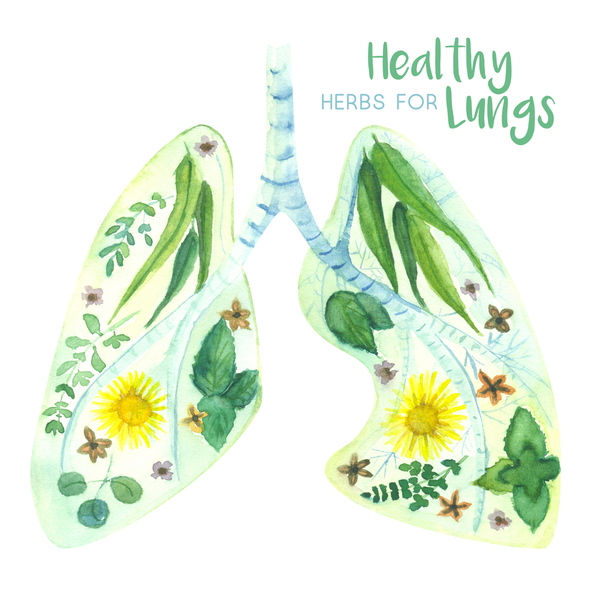It looks like we’re finally starting to feel some relief from the oppressive smog that’s been hovering over Portland the past 9 days. We’ve almost made it through and now it’s time to take care of our lungs.
Today I’m going to discuss my favorite lung herbs starting with my two favorites, mullein and coltsfoot.
Mullein leaf (Verbascum thapsus)
Mullein has a strong affinity for the lungs. It’s a normalizer for the lungs as well as a demulcent (soothes and relieves irritable mucus membranes). It’s used for all conditions associated with inflammation in the respiratory tract.
Mullein is very common in the United States. For lung health, we use the leaves as an herbal infusion (like a tea).
Note: If you’re not sure how to make a herbal infusion, check out this live video on the FLOURISH Facebook page to learn how.
Coltsfoot leaf (Tussilago farfara)
Coltsfoot also has an affinity for the lungs. It acts as a gentle expectorant (loosens and promotes the gentle flow of mucus), as well as also being a demulcent. It’s great for dry coughs, shortness of breath, hoarseness, and bronchitis.
Coltsfoot is also easy to find and is prepared as an infusion.
*The combination of mullein and coltsfoot is an old standby in herbal medicine and quite effective.
Consider taking 1 quart of this combination as an infusion for the next two weeks.
Be advised: While mullein has no contraindications, coltsfoot is not for use in pregnancy or breastfeeding or by anyone with known liver disease. Coltsfoot should be used only for a short time due to the presence of pyrrolizidine alkaloids (PA’s), which may harm the liver with long- term use.
Other lung herb choices:
Licorice root (Glycyrrhiza glabra):
Licorice is a relaxing expectorant (brings up the mucus without causing drastic coughing) for unproductive coughs with dry throat and for all irritable lung conditions.
Licorice root is also very common and easy to find. The root is used as a decoction (simmered in water for 30 minutes).
Licorice should also not be used during pregnancy and only under professional supervision if you have diabetes or high blood pressure.
Marshmallow root (Althea officinalis)
Marshmallow is a soothing demulcent. It’s helpful for any irritation of mucus membranes, dry cough, and bronchitis.
The best way to make it is to put the chopped root into cold water and let it set for several hours. It will be gooey, so you can add it to other teas once it’s infused if that makes it more palatable.
The only thing to watch for with marshmallow root is that it can block absorption of other medications and supplements, so don’t take it at the same time as your other remedies.
Thyme leaf (Thymus vulgaris)
Thyme is known for its ability to fight all infections, including viral, bacterial, and fungal, and has an affinity for the respiratory tract. If irritation from the smoke has morphed into a possible infection, thyme can be helpful.
Thyme is best taken as an infusion.
It is not recommended for pregnancy and should not be taken for long-term use.
If you’re my patient, you can contact me to get any of these herbs. If you’re in Portland, you can support local business by getting your herbs from Dragon Herbarium or Herb Stomp. It looks like they both have these herbs in stock. And, I always love to order online from Mountain Rose Herbs.
Here’s a live video on the FLOURISH Facebook page if you’d like to do some breathing with me.
As always per our terms of use, this blog is not meant to serve as medical advice and you should always consult your own healthcare provider for personal advice.


Recent Comments